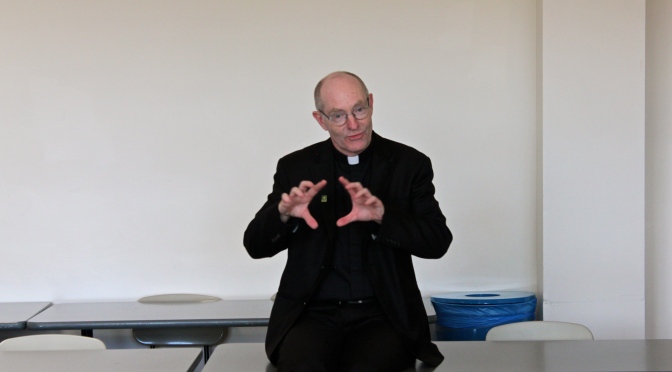Mario Garcia and Tory Wells
Contributing Writers
After getting the names, majors and years of a group of student reporters, University of San Francisco President the Rev. Paul Fitzgerald, S.J. startled the class by falling to his knees in the middle of the room. The students erupted in surprised laughter that made it hard to hear what he was saying about this being part of a Jesuit ritual. It was just a moment that he was on the ground, but it set a good tone. Later, people would remember how often he said, “we,” not “I” and how he remembered everyone’s name. When discussing his hopes for the school, he emphasized community effort to bring changes to USF instead of his personal doing.
There was something more to Father Fitzgerald besides his jokes and calmness. Underneath the simple attitude was a man eager to learn and engage.
This passion to learn and understand dates all the way back to his undergraduate days at Santa Clara University. Although he admitted to being “bored” with high school, he said he approached college as an opportunity to immerse himself “into this whole world of ideas.” He was the first in his family to receive a bachelor’s degree and is proud that his mother earned her degree about eight years after he did. As a student in the 1970’s, he came to parties at USF and hung out in the Haight.
Living in places such as Kenya and Germany and Mexico, Father Fitzgerald has been influenced by the cultures and perspectives around him. Noting that he could see the San Francisco skyline while the students with their backs to the window could only see him and the board, he said, “Where we sit determines how we view the world.” Through this metaphor he explained how important it was to change your place in the world in order to gain different perspectives.
He is fluent in German and French and conversational in Spanish. He said he believes in the importance of learning different languages and traveling because “when you think in another language, you process the world differently… [and] if we never leave the United States we’re only going to see reality from our vantage point.”
On the way to becoming a Jesuit, he completed a two-year novitiate in Santa Barbara, which he says was “like a long engagement.” During this time, he took classes, learned how to pray, worked long days in avocado fields, and considered questions like, “Who was Jesus?” and “If I ran into him at a bar would I want to have a beer with him?”
His transition into the USF president’s office has been made easier because he has known former USF president the Rev. Stephen A. Privett, S.J. for 25 years and now they are living across the hall from each other in Loyola House. About Privett, he said, “His worldview and my worldview are the same. There is no discontinuity. We have different personalities, but we both have the same Jesuit formation. We both are looking at the same kind of global initiatives.”
The two recently returned from an 11-day trip to China where they met with alumni. Fitzgerald said that while most international students come from affluent families, he hoped to find scholarships to attract strong students from Jesuit high schools in developing countries to USF. Getting greater socioeconomic diversity among students is one of his goals.
President Fitzgerald said he intends to uphold USF’s “great academic rigor” while helping students to “really name their dreams and their passions and grab those and move towards them” in an effort to produce alumni who are “civically engaged and socially responsible.” He mentioned that USF’s students are among the shockingly low one percent of the people in the world who are in college. He hopes that with this responsibility and privilege in mind, USF students will be “the ones who think about the world and who think about the other 99%.”
Fitzgerald wants students to become critical thinkers and question the issues they see around them. He said having a good job is important but “the market does not solve problems. The market did not end slavery. The market did not end child labor. The market did not solve the exploitation of women. The market is morally neutral, so it takes people with values and courage to fight for what is right.” His hope is that USF will, in his words — “ruin”– students into pursuing that fight.

